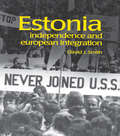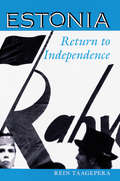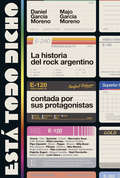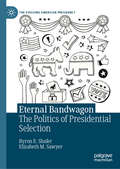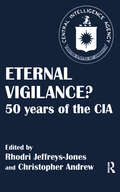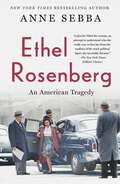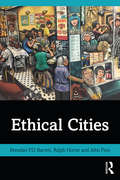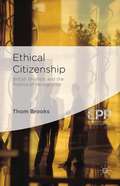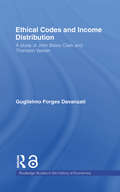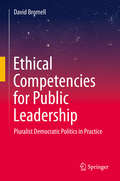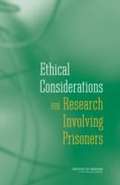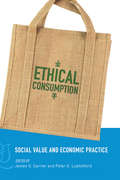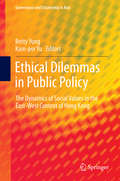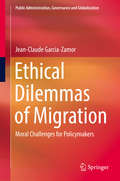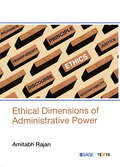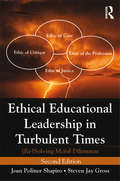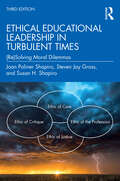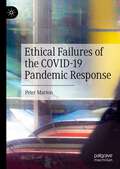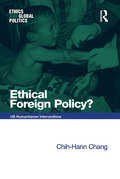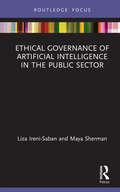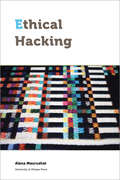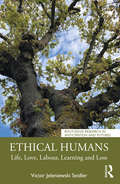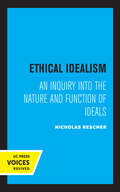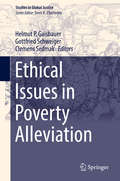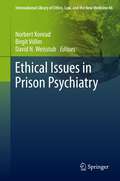- Table View
- List View
Estonia: Independence and European Integration (Postcommunist States and Nations #8)
by David SmithIn 1998, Estonia became the first of the former Soviet republics to enter membership negotiations with the European Union. Since then it has been hailed as 'the model pupil' amongst the current applicants. This study traces the remarkable reforms that have propelled Estonia from the USSR to the threshold of the EU in less than a decade. The work also explores the tensions inherent in the concept of a postcommunist 'return to Europe'. Since 1991, membership of western transnational organizations has been consistently portrayed as the best guarantee of Estonia's independence. Yet the membership criteria imposed by these organizations have frequently confllicted with the nationalist priority of restoring a sovereign Estonian nation-state. At the same time, Estonia's geopolitically-sensitive location poses a dilemma for the West, thereby ensuring that the country will remain the 'litmus test' - not just of Russia's intentions towards Europe, but of the 'New Europe' as a whole.
Estonia: Return To Independence
by Rein TaageperaAfter breaking free from the Bolsheviks in 1918, Estonia enjoyed independence until 1940, when the country was subsumed by the Soviet Union. Not until 1991 was Estonia able to make its next successful bid for sovereignty. In this book, Rein Taagepera traces the evolution of Estonia from prehistory to the present, when a radical turn of events in the former Soviet Union once again altered the destiny of this Baltic nation.The author explores in depth the remarkable changes in Estonia since 1980, framing his analysis within the larger picture of the Soviet Union and its demise. He also examines the issue of ethnic tensions between Estonians and Russian colonists and speculates on how unrest will affect the future of the country. Throughout his analysis, the author weaves in such key questions as: Why did Sovietization fail? How did Estonia's quest for autonomy affect Soviet dissolution? What role will the country play on the global stage? What will Estonia's future hold?
Está todo dicho: La historia del rock argentino contada por sus protagonistas
by Daniel García Moreno Majo García MorenoLa historia oral y coral definitiva del rock argentino: a través del testimonio de sus grandes protagonistas -de Charly, Fito y Spinetta a Cerati, Prodan, Vicentico, Ciro, Pity, Litto Nebbia, Lebón, Javier Martínez y 70 figuras más-, registrado a lo largo de numerosos programas producidos para la televisión de los años 80 por Daniel y Josi García Moreno, toma forma un relato extraordinario. Pocas personas han hecho tanto por documentar el origen y el devenir del rock rioplatense -una historia que abarca ya más de cinco décadas- como los hermanos Dany y Josi García Moreno. A través de numerosos programas televisivos (Rocanrol, La Cueva, Quizás porqué), y documentales como 30 años de rock nacional, fueron creando un registro audiovisual extraordinario. En las voces de decenas de artistas entrevistados para esas producciones y transcriptas en este libro, hoy toma forma una mirada múltiple y diversa sobre el movimiento y las circunstancias que debió atravesar en un mundo de inestabilidad institucional, prejuicios y grosera censura. Una versión posible de qué es el rock argentino. El relato coral de una historia única. «A lo largo de décadas, Dany y Josi García Moreno y Eduardo Berti grabaron a todos, desde los pioneros hasta las nuevas generaciones. Realizaron reportajes memorables de enorme valor histórico y confesiones increíbles. Si alguien se tomara el trabajo de desgrabar, ordenar y dar forma a ese material, sería un libro formidable. Por suerte, Dany y su sobrina Majo (productora y periodista) se animaron a encararlo. Y este es el resultado».Marcelo Fernández Bitar «Hay algo fascinante en este collage: cada una de las voces habla desde un lugar diferente y desde un tiempo distinto. No solamente este libro no se hizo desde hoy, sino que se hizo desde múltiples pasados, lo que depara una suerte de caleidoscopio móvil (...), una banda sonora documental sobre la banda sonora musical de más de una generación. Una apasionante carambola a dos bandas».Eduardo Berti «Cuando apareció el rock en castellano fue un impacto extraordinario: ¿Cómo? ¿Se puede cantar rock en español?».Javier Martínez «Para nosotros naufragar era quedarnos de bohemia hasta las 8 o 9 de la mañana. Aparecía la gente que se iba a trabajar, que recién se levantaba, y nosotros que no nos habíamos acostado siquiera, éramos los sobrevivientes del naufragio».Litto Nebbia «Esa época, los años 70, era peligrosa y linda. Yo escuchaba la sirena y ya me ponía contra la pared porque pensaba que siempre era para mí. (Pero) nosotros éramos imparables, teníamos una misión».David Lebón «Yo creo en las cosas que transforman y creo que, de alguna manera, con mi música he transformado algunas pautas».Spinetta «Creo que los fans de Los Redondos no tienen la más puta idea de qué hablan las letras. Y así y todo, las cantan y se emocionan. Es el poder del arte».Lito Vitale «(En la música de Charly García) escuchás que la alegría no es solo brasilera por primera vez en la historia argentina. Porque parece que el único pulso vital que ha tenido Argentina ha sido el de la guerra, la sangre, las peleas estéticas y la tragedia. Y en Charly eso aparece como una cosa novedosa... la alegría. Es la idea más importante que veo en Charly y posiblemente en el rock».Fito Páez
Eternal Bandwagon: The Politics of Presidential Selection (The Evolving American Presidency)
by Byron E. Shafer Elizabeth M. SawyerOrthodox reporting and conventional scholarship focuses on the factors that distinguish each presidential contest and then attempts to explain them. This book rather, demonstrates that the politics of presidential nomination has been remarkably stable in the United States since the 1830s and right through to 2020. A common bandwagon dynamic, rolling once through party organizations and now through presidential primaries, permits a simple measure that has predicted nominations well before the decisive threshold was reached, while allowing precise comparisons across the years. So it becomes possible to separate the handful of things that matter for winnowing a large and diverse society into two individual presidential nominees. This funnel of causality moves through the occupational and careers seedbeds of a field of presidential aspirants, squeezing these fields by way of a small set of structural shapers, until party factions and factional struggles—not rules of the game, not candidate characteristics, not nominating strategies, nor all the other ephemera so beloved of commentators and observers—actually choose a given nominee.
Eternal Vigilance?: 50 years of the CIA (Studies in Intelligence)
by Christopher Andrew Rhodri Jeffreys-JonesEternal Vigilance? seeks to offer reinterpretations of some of the major established themes in CIA history such as its origins, foundations, its treatment of the Soviet threat, the Iranian revolution and the accountability of the agency. The book also opens new areas of research such as foreign liaison, relations with the scientific community, use of scientific and technical research and economic intelligence. The articles are both by well-known scholars in the field and young researchers at the beginning of their academic careers. Contributors come almost equally from both sides of the Atlantic. All draw, to varying degrees, on recently declassified documents and newly-available archives and, as the final chapter seeks to show, all point the way to future research.
Ethel Rosenberg: An American Tragedy
by Anne SebbaNew York Times bestselling author Anne Sebba's moving biography of Ethel Rosenberg, the wife and mother whose execution for espionage-related crimes defined the Cold War and horrified the world.In June 1953, Julius and Ethel Rosenberg, a couple with two young sons, were led separately from their prison cells on Death Row and electrocuted moments apart. Both had been convicted of conspiracy to commit espionage for the Soviet Union, despite the fact that the US government was aware that the evidence against Ethel was shaky at best and based on the perjury of her own brother.This book is the first to focus on one half of that couple for more than thirty years, and much new evidence has surfaced since then. Ethel was a bright girl who might have fulfilled her personal dream of becoming an opera singer, but instead found herself struggling with the social mores of the 1950’s. She longed to be a good wife and perfect mother, while battling the political paranoia of the McCarthy era, anti-Semitism, misogyny, and a mother who never valued her. Because of her profound love for and loyalty to her husband, she refused to incriminate him, despite government pressure on her to do so. Instead, she courageously faced the death penalty for a crime she hadn’t committed, orphaning her children.Seventy years after her trial, this is the first time Ethel’s story has been told with the full use of the dramatic and tragic prison letters she exchanged with her husband, her lawyer and her psychotherapist over a three-year period, two of them in solitary confinement. Hers is the resonant story of what happens when a government motivated by fear tramples on the rights of its citizens.
Ethical Cities
by Ralph Horne John Fien Brendan F.D. BarrettCombining elements of sustainable and resilient cities agendas, together with those from social justice studies, and incorporating concerns about good governance, transparency and accountability, the book presents a coherent conceptual framework for the ethical city, in which to embed existing and new activities within cities so as to guide local action. The authors’ observations are derived from city-specific surveys and urban case studies. These reveal how progressive cities are promoting a diverse range of ethically informed approaches to urbanism, such as community wealth building, basic income initiatives, participatory budgeting and citizen assemblies. The text argues that the ethical city is a logical next step for critical urbanism in the era of late capitalism, characterised by divisive politics, burgeoning inequality, widespread technology-induced disruptions to every aspect of modern life and existential threats posed by climate change, sustainability imperatives and pandemics. Engaging with their communities in meaningful ways and promoting positive transformative change, ethical cities are well placed to deliver liveable and sustainable places for all, rather than only for wealthy elites. Likewise, the aftermath of shocks such as the 2008 Global Financial Crisis and the Covid-19 pandemic reveals that cities that are not purposeful in addressing inequalities, social problems, unsustainability and corruption face deepening difficulties. Readers from across physical and social sciences, humanities and arts, as well as across policy, business and civil society, will find that the application of ethical principles is key to the pursuit of socially inclusive urban futures and the potential for cities and their communities to emerge from or, at least, ameliorate a diverse range of local, national and global challenges.
Ethical Citizenship
by Thom BrooksCitizenship has come under increasing strain in the face of globalization. Our world gets ever smaller while it sometimes seems our borders are becoming ever more closed. What is citizenship and how can it be ethical? Should citizens owe each other special duties denied to non-citizens? How might theories about citizenship impact on our practices? Ethical Citizenship rediscovers a significant and distinctive contribution to how we might understand citizenship today in the first full length examination of this topic. Ethical citizenship is a communitarian relationship between members of a community based around a shared conception of the common good first defended by British Idealists. This book explores its historical roots, contemporary relevance and application to international politics in an engaging work by leading international scholars bringing together theory and practice.
Ethical Codes and Income Distribution: A Study of John Bates Clark and Thorstein Veblen (Routledge Studies in the History of Economics #Vol. 79)
by Guglielmo Forges DavanzatiIn contemporary non-mainstream economic debate, it is widely thought that the functioning of a market economy needs a set of rules (i.e. institutions) which bind agents in their behaviour, allowing efficient outcomes. This idea is contrary to the General Equilibrium Model (GEM) where markets are pictured as working in an institutional vacuum and where social and historical variables play no role. However, in more recent times, a large group of economists have begun to insert social and moral variables into standard models based on the rational choice paradigm, following the increasing interest – on the part of firms – in the possible positive effects of adopting ethical codes. In this key new text Guglielmo Davanzati studies this burgeoning view that ethics and economics can be compatible. Does ‘morality’ affect income distribution? And, if so, what are the effects of the widespread adoption of ethical codes on the functioning of the labour market? Central to Davanzati’s efforts is the thesis that the roots of these new developments can be traced back to the pioneering work of Thorstein Veblen and John Bates Clark. Utilizing their contrasting works, Davanzati’s text illuminates the propagation of ethical codes within the two opposing frameworks i.e. the neoclassical and the institutional. Davanzati’s important book will be an invaluable reference for readers interested in history of economic thought, economics and moral philosophy.
Ethical Competencies for Public Leadership: Pluralist Democratic Politics in Practice
by David BromellThis book identifies six ethical competencies for public leadership in contexts of pluralism. While diversity in proximity generates conflict where people want and value different things, the right kind of leadership and the right kind of politics can minimise domination, humiliation, cruelty and violence.Written by a public policy advisor for fellow practitioners in politics and public life, this book applies political theory and social ethics to identify a set of competencies—being civil, diplomatic, respectful, impartial, fair and prudent—to keep ethics at the centre of a pluralist democratic politics. The six competencies are described in behavioural terms as personal resolutions. They offer valuable tools for mentoring and professional development.This book will appeal to politicians and those who advise them, and anyone who engages in or aspires to public leadership, whether in the public sector, the private sector, the community and voluntary sector or academia.
Ethical Considerations FOR Research Involving Prisoners
by Institute of Medicine of the National AcademiesIn the past 30 years, the population of prisoners in the United States has expanded almost 5-fold, correctional facilities are increasingly overcrowded, and more of the country's disadvantaged populations&#8212racial minorities, women, people with mental illness, and people with communicable diseases such as HIV/AIDS, hepatitis C, and tuberculosis&#8212are under correctional supervision. Because prisoners face restrictions on liberty and autonomy, have limited privacy, and often receive inadequate health care, they require specific protections when involved in research, particularly in today's correctional settings. Given these issues, the Department of Health and Human Services' Office for Human Research Protections commissioned the Institute of Medicine to review the ethical considerations regarding research involving prisoners. The resulting analysis contained in this book, Ethical Considerations for Research Involving Prisoners, emphasizes five broad actions to provide prisoners involved in research with critically important protections: &#8226 expand the definition of "prisoner"; &#8226 ensure universally and consistently applied standards of protection; &#8226 shift from a category-based to a risk-benefit approach to research review; &#8226 update the ethical framework to include collaborative responsibility; and &#8226 enhance systematic oversight of research involving prisoners.
Ethical Consumption
by Peter G. Luetchford James G. CarrierIncreasingly, consumers in North America and Europe see their purchasing as a way to express to the commercial world their concerns about trade justice, the environment and similar issues. This ethical consumption has attracted growing attention in the press and among academics. Extending beyond the growing body of scholarly work on the topic in several ways, this volume focuses primarily on consumers rather than producers and commodity chains. It presents cases from a variety of European countries and is concerned with a wide range of objects and types of ethical consumption, not simply the usual tropical foodstuffs, trade justice and the system of fair trade. Contributors situate ethical consumption within different contexts, from common Western assumptions about economy and society, to the operation of ethical-consumption commerce, to the ways that people's ethical consumption can affect and be affected by their social situation. By locating consumers and their practices in the social and economic contexts in which they exist and that their ethical consumption affects, this volume presents a compelling interrogation of the rhetoric and assumptions of ethical consumption.
Ethical Dilemmas in Public Policy
by Betty Yung Yu Kam PorThis book employs a unique interdisciplinary approach to analyze different ethical dilemmas in public policy, applying values and concepts to examine substantive policy and public issues that are grounded in practical realities (by integrating philosophy, political science, law, policy studies etc. ), thereby bringing fresh insights to governance. Building on the nascent scholarly literature on the role of values in governance, it focuses on analyzing "social values in public policy" in the East-West context of Hong Kong, yielding new insights on how to achieve good governance by reflecting on public affairs and policy issues from a social values perspective. The book will be of interest to researchers, postgraduate and undergraduate students in the fields of philosophy, political science, public policy and social science in general, while politicians, public administrators, policy researchers and other professionals (e. g. teachers, journalists, social workers, doctors etc. ) from both East and West will find it stimulating and constructive. The book offers well-founded reading and reference material for citizenship education, e. g. as teaching materials, especially for General Education courses at universities and Liberal Studies and Arts curricula in secondary schools. It also provides food for thought on the part of general citizens. "This will be a very important and unique book in the study of ethical pluralism and public policy in Hong Kong. " - Professor Sonny Lo Shiu Hing "Public policy both reflects and shapes social values and social norms. However, the so- cial values and ethical dimensions of public policy are often left implicit and unexplored in policy analysis and policy formulation. The big questions - what kind of society do we want to create? What is at stake here? Whose values? - are debated and discussed in some other context which is more distant from the applied world of policymaking. This book takes a different position and puts ethical issues and social values up front in an exploration of a number of key public policy issues in Hong Kong. In doing so, the book makes a very timely intervention in Hong Kong's increasingly contentious public affairs and makes an important contribution to the general literature. " - Professor Ray Forrest
Ethical Dilemmas of Migration: Moral Challenges For Policymakers (Public Administration, Governance And Globalization Ser. #5)
by Jean-Claude Garcia-ZamorThis book discusses the ethical dilemmas of migration in the era of globalization. Centered on the recent influx of large numbers of migrants and refugees to the United States and Europe and viewed through the lens of the 2016 World Humanitarian Summit and the United Nations Summit on Refugees and Migrants, this book focuses on the problems posed by globalized migration and analyzes proposed responses. Using prominent ethical theories and moral principles, such as Utilitarianism, duty, justice, and integrity, the book proposes a framework for analyzing decision-making by migrants and policymakers and formulating equitable policies to address the migration crisis. Drawing attention to the ethical dilemmas that migrants and policymakers experience, this book fills a gap in the literature and enriches it, adding to the economic, political, and human rights issues that are traditionally part of the migration discussion. Appropriate for students and scholars of ethics, policy, and political science, this book is also meant to be of use to practitioners and decision-makers faced with similar decisions.
Ethical Dimensions of Administrative Power
by Amitabh RajanThis insightful textbook explores the use and application of ethics in contemporary governance and suggests necessary reforms Discussions on administrative ethics need an interdisciplinary approach involving the fields of political science, law, economics, sociology, management and philosophy. Combining the perspectives from these fields, this textbook analyses their applicability and usefulness in everyday practices in governance, covering its five cardinal virtues - prudence, transparency, discourse, justice and accountability. The textbook highlights ethical challenges in aspects of status recognition, oppression, empowerment, social care, public financing, environment protection and others in today's interconnected world. It delves into the dynamics of administrative power in democracies and showcases how the misuse of power can be controlled through a discourse of ethics in law and governance. Key Features: • Practical insights and examples from around the world to connect the younger generation with the role of ethics in administration and governance • Plethora of teaching - learning tools such as illustrative case studies, notes on administrative thinkers, glossary of key concepts and select reading list • Chapters aided by study questions for self-assessment, appendices on key documents used in governance ethics and a list of landmark instances in administrative history
Ethical Educational Leadership in Turbulent Times: (Re) Solving Moral Dilemmas
by Joan Poliner Shapiro Steven Jay GrossEducational leaders not only face moral and ethical decisions regarding their classrooms, schools, districts, and education institutions, but they also must consider the complexities and threats that impact their communities. In this unstable era of war, terrorism, natural disasters, accountability, and high stakes testing, this process is particularly daunting. Ethical Educational Leadership in Turbulent Times is an engaging, case-study based text that will assist leaders in their ethical decision-making processes during a time of turbulence and uncertainty. The book is framed by Gross’s Turbulence Theory and Shapiro and Stefkovich’s Multiple Ethical Paradigms of justice, critique, care, and the profession. Presenting clear explanations of theory in combination with authentic dilemmas developed by practitioners, this book will assist leaders in dealing with challenging situations in their own settings. New in the Second Edition: Expanded discussion of Turbulence Theory and addition of the most recent scholarship in the field of ethical leadership. New cases addressing adequate yearly progress, misuse of student data, financial pressures, curriculum design, student safety, athletics, and social justice issues. Updated end-of-case questions to reflect contemporary issues. Ethical Educational Leadership in Turbulent Times is a valuable book for both aspiring and practicing educational administrators and leaders.
Ethical Educational Leadership in Turbulent Times: (Re) Solving Moral Dilemmas
by Steven Jay Gross Joan Poliner Shapiro Susan H. ShapiroEducational leaders not only face moral and ethical decisions regarding their classrooms, schools, districts, and education institutions, but they also must consider the complexities and threats that impact their communities. Amidst the ongoing challenges of pandemics and natural disasters, this process is exceptionally daunting. Ethical Educational Leadership in Turbulent Times is an engaging, case-study-based text that assists leaders in their ethical decision-making processes during a time of turbulence and uncertainty. The book is framed by Gross’ Turbulence Theory and Shapiro and Stefkovich’s Multiple Ethical Paradigms of justice, critique, care, and the profession. Presenting clear explanations of theory in combination with authentic dilemmas developed by practitioners, this book will assist leaders in dealing with challenging situations in their own settings. Ethical Educational Leadership in Turbulent Times, 3rd edition is a valuable book for both aspiring and practicing educational administrators and leaders.New in this edition: Updated cases throughout to reflect contemporary issues and recent scholarship in the field New topical case coverage on topics relating to the post-pandemic climate, race and ethnicity, social media, and culturally sensitive teaching An entirely new chapter with cases about technology, including the strengths and weaknesses of AI in education
Ethical Failures of the COVID-19 Pandemic Response
by Péter MartonThis book draws attention to the non-biological—political, economic, societal and cultural—variables shaping both the emergence and persistence of the COVID-19 pandemic and the global response to it, with a particular focus on political decisionmakers’ role in the domestic and international politics surrounding the process of the pandemic. The book identifies the strategic and underlying ethical failures of decision making, using a process-tracing approach to reconstruct considerations, decisions and actions by key leaders—interested in thus weaving a global narrative of the response. The author highlights key speech acts, and interprets the causal implications embedded in a chronological and contextualised appraisal of events, statements and public health measures. The book further discusses the normative ethics of pandemic response, and presents lessons drawn from the present experience. It also offers a normative analysis taking into consideration pre-pandemic guidelines for response, including in the literature of public health ethics and pandemic preparedness plans.
Ethical Foreign Policy?: US Humanitarian Interventions (Ethics and Global Politics)
by Chih-Hann ChangWhile the 1990s gave rise to a wealth of literature on the notion of ethical foreign policy, it has tended to simply focus on a version of realism, which overlooks the role of ethics in international affairs, lacking an empirical analysis of foreign policy decision-making, with relation to ethical values in the post-Cold War period. This book addresses this gap in the literature by exploring ethical realism as a theoretical framework and, in particular, by looking at US humanitarian interventions at an empirical level to analyse ethical foreign policy in practice. Furthermore, it moves beyond the debate on legality or legitimacy of humanitarian interventions and focuses on whether a state would intervene for humanitarian purposes. Chang provides a deeper understanding of ethical foreign policy in theory and practice by applying ethical realism as a theoretical framework to evaluate the Clinton administration's foreign policy on humanitarian intervention. She addresses concepts of moral leadership and pragmatic foreign policy in the field of international relations in general and foreign policy analysis in particular.
Ethical Governance of Artificial Intelligence in the Public Sector
by Liza Ireni-Saban Maya ShermanThis book argues that ethical evaluation of AI should be an integral part of public service ethics and that an effective normative framework is needed to provide ethical principles and evaluation for decision-making in the public sphere, at both local and international levels. It introduces how the tenets of prudential rationality ethics, through critical engagement with intersectionality, can contribute to a more successful negotiation of the challenges created by AI technological innovations in AI and afford a relational, interactive, flexible, and fluid framework that meets the features of AI research projects, so that core public and individual values are still honoured in the face of technological development. This book will be of key interest to scholars, students, and professionals engaged in public management and ethics management, AI ethics, public organizations, public service leadership, and more broadly to public administration and policy, as well as applied ethics and philosophy.
Ethical Hacking (Law, Technology and Media)
by Alana MaurushatHow will governments and courts protect civil liberties in this new era of hacktivism? Ethical Hacking discusses the attendant moral and legal issues. The first part of the 21st century will likely go down in history as the era when ethical hackers opened governments and the line of transparency moved by force. One need only read the motto “we open governments” on the Twitter page for Wikileaks to gain a sense of the sea change that has occurred. Ethical hacking is the non-violent use of a technology in pursuit of a cause—political or otherwise—which is often legally and morally ambiguous. Hacktivists believe in two general but spirited principles: respect for human rights and fundamental freedoms, including freedom of expression and personal privacy; and the responsibility of government to be open, transparent and fully accountable to the public. How courts and governments will deal with hacking attempts which operate in a grey zone of the law and where different ethical views collide remains to be seen. What is undisputed is that Ethical Hacking presents a fundamental discussion of key societal questions. A fundamental discussion of key societal questions. This book is published in English. - La première moitié du XXIe siècle sera sans doute reconnue comme l’époque où le piratage éthique a ouvert de force les gouvernements, déplaçant les limites de la transparence. La page twitter de Wikileaks enchâsse cet ethos à même sa devise, « we open governments », et sa volonté d’être omniprésent. En parallèle, les grandes sociétés de technologie comme Apple se font compétition pour produire des produits de plus en plus sécuritaires et à protéger les données de leurs clients, alors même que les gouvernements tentent de limiter et de décrypter ces nouvelles technologies d’encryption. Entre-temps, le marché des vulnérabilités en matière de sécurité augmente à mesure que les experts en sécurité informatique vendent des vulnérabilités de logiciels des grandes technologies, dont Apple et Google, contre des sommes allant de 10 000 à 1,5 million de dollars. L’activisme en sécurité est à la hausse. Le piratage éthique est l’utilisation non-violence d’une technologie quelconque en soutien d’une cause politique ou autre qui est souvent ambigue d’un point de vue juridique et moral. Le hacking éthique peut désigner les actes de vérification de pénétration professionnelle ou d’experts en sécurité informatique, de même que d’autres formes d’actions émergentes, comme l’hacktivisme et la désobéissance civile en ligne. L’hacktivisme est une forme de piratage éthique, mais également une forme de militantisme des droits civils à l’ère numérique. En principe, les adeptes du hacktivisme croient en deux grands principes : le respect des droits de la personne et les libertés fondamentales, y compris la liberté d’expression et à la vie privée, et la responsabilité des gouvernements d’être ouverts, transparents et pleinement redevables au public. En pratique, toutefois, les antécédents comme les agendas des hacktivistes sont fort diversifiés. Il n’est pas clair de quelle façon les tribunaux et les gouvernements traiteront des tentatives de piratage eu égard aux zones grises juridiques, aux approches éthiques conflictuelles, et compte tenu du fait qu’il n’existe actuellement, dans le monde, presque aucune exception aux provisions, en matière de cybercrime et de crime informatique, liées à la recherche sur la sécurité ou l’intérêt public. Il sera également difficile de déterminer le lien entre hacktivisme et droits civils. Ce livre est publié en anglais.
Ethical Humans: Life, Love, Labour, Learning and Loss (Routledge Research in Anticipation and Futures)
by Victor Jeleniewski SeidlerEthical Humans questions how philosophy and social theory can help us to engage the everyday moral realities of living, working, loving, learning and dying in new capitalism. It introduces sociology as an art of living and as a formative tradition of embodied radical eco post-humanism. Seeking to embody traditions of philosophy and social theory in everyday ethics, this book validates emotions and feelings as sources of knowledge and shows how the denigration of women has gone hand in hand with the denigration of nature. It queries post-structuralist traditions of anti-humanism that, for all their insights into the fragmentation of identities, often sustain a distinction between nature and culture. The author argues that in a crisis of global warming, we have to learn to listen to our bodies as part of nature and draws on Wittgenstein to shape embodied forms of philosophy and social theory that questions theologies that tacitly continue to shape philosophical traditions. In acknowledging our own vulnerabilities, we question the vision of the autonomous and independent rational self that often remains within the terms of dominant white masculinities. This book offers different modes of self-work, drawing on psychoanalysis and embodied post-analytic psychotherapies as part of a decolonising practice questioning Eurocentric colonising modernity. In doing so it challenges, with Simone Weil, Roman notions of power and greatness that have shaped visions of white supremacy and European colonial power and empire. This book will be of great interest to students and scholars of environmental ethics, environmental philosophy, social theory and sociology, ethics and philosophy, cultural studies, future studies, gender studies, post-colonial studies, Marxism, psychoanalysis and psychotherapy and philosophy and sociology as arts of living.
Ethical Idealism
by Nicholas RescherThis title is part of UC Press's Voices Revived program, which commemorates University of California Press’s mission to seek out and cultivate the brightest minds and give them voice, reach, and impact. Drawing on a backlist dating to 1893, Voices Revived makes high-quality, peer-reviewed scholarship accessible once again using print-on-demand technology. This title was originally published in 1987.
Ethical Issues in Poverty Alleviation
by Gottfried Schweiger Helmut P. Gaisbauer Clemens SedmakThis book explores the philosophical, and in particular ethical, issues concerning the conceptualization, design and implementation of poverty alleviation measures from the local to the global level. It connects these topics with the ongoing debates on social and global justice, and asks what an ethical or normative philosophical perspective can add to the economic, political, and other social science approaches that dominate the main debates on poverty alleviation. Divided into four sections, the volume examines four areas of concern: the relation between human rights and poverty alleviation, the connection between development and poverty alleviation, poverty within affluent countries, and obligations of individuals in regard to global poverty. An impressive collection of essays by an international group of scholars on one of the most fundamental issues of our age. The authors consider crucial aspects of poverty alleviation: the role of human rights; the connection between development aid and the alleviation of poverty; how to think about poverty within affluent countries (particularly in Europe); and individual versus collective obligations to act to reduce poverty. Judith Lichtenberg Department of Philosophy Georgetown University This collection of essays is most welcome addition to the burgeoning treatments of poverty and inequality. What is most novel about this volume is its sustained and informed attention to the explicitly ethical aspects of poverty and poverty alleviation. What are the ethical merits and demerits of income poverty, multidimensional-capability poverty, and poverty as nonrecognition? How important is poverty alleviation in comparison to environmental protection and cultural preservation? Who or what should be agents responsible for reducing poverty? The editors concede that their volume is not the last word on these matters. But, these essays, eschewing value neutrality and a retreat into technical mastery, challenge us to find fresh and reasonable answers to these urgent questions. David A. Crocker School of Public Policy University of Maryland
Ethical Issues in Prison Psychiatry
by Birgit Völlm David N. Weisstub Norbert KonradRecent surveys demonstrate a high and possibly increasing prevalence of mental disorders in prisoners. They have an increased risk of suffering from a mental disorder that transcends countries and diagnoses. Ethical dilemmas in prison psychiatry arise from resource allocation and include issues of patient choice and autonomy in an inherently coercive environment. Ethical conflicts may arise from the dual role of forensic psychiatrists giving raise to tensions between patient care/protection of the public.This book describes models and ethical issues of psychiatric healthcare in prison in several countries. Relevant issues are: the professional medical role of a psychiatrist and/or psychotherapist working in prison, the involvement of psychiatrists in disciplinary or coercive measures; consent to treatment, the use of coercion in forcing a prisoner to undergo treatment, hunger strike, confidentiality. The book ends with consensus guidelines concerning good practice in Prison Psychiatry.
